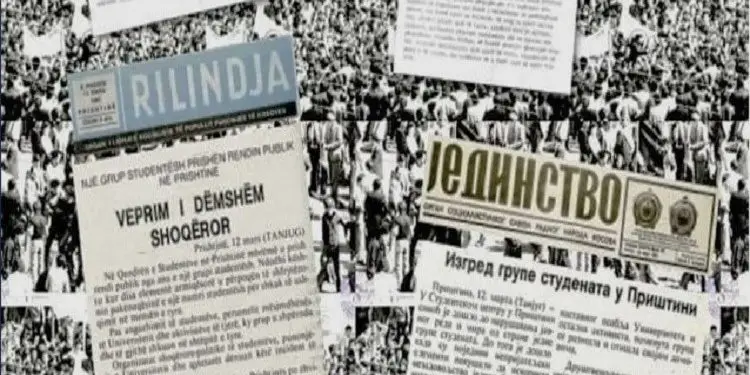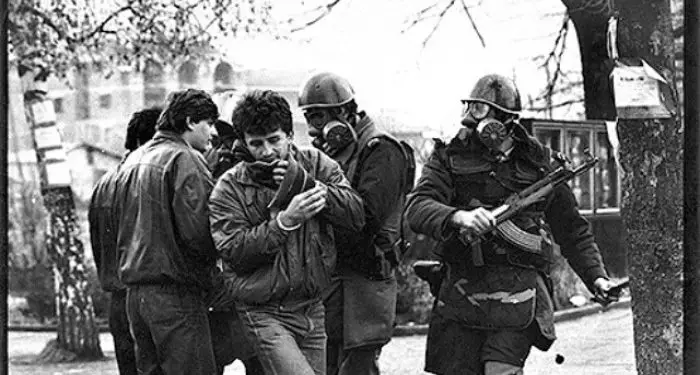From Qerim Lita
Part Two
DOCUMENTS / When the whole world reported on the demonstrations of 1981
Memorie.al / In Western analyses and comments, the events in Kosovo were, as usual, placed in the context of the overall situation in Yugoslavia, the Balkans, and beyond. In this regard, old speculations about the future of post-Tito Yugoslavia and the numerous implications of the Kosovo events in the relationships between blocs in the Balkan region were revived…! The violence and police-military terror of Yugoslavia against the Albanian demonstrators in Kosovo during March-April 1981 shook the then Western democratic opinion. International human rights organizations, such as “Amnesty International,” the “Committee for a Free World,” and others, placed the Socialist Federative Republic of Yugoslavia among those countries that violated human rights and freedoms.
Continued from the previous issue
II
In internal conversations, Eastern European interlocutors emphasized the reasonableness of our “strong” and determined stance against counter-revolutionary activities. It is interesting that Eastern European journalists in Yugoslavia showed no interest or commented on the events in Kosovo.
It is characteristic that they also showed no interest in organizing visits for journalists to Kosovo and attempted to sideline this topic. In light of the events in Kosovo, the Soviet press continued with a trend of restrained and fact-graphic reporting on the overall political situation in Yugoslavia.
Soviet media published only six reports about the events in Kosovo, all of which were featured in central newspapers. Reporting on the occurrences in Kosovo relied on statements from our highest leaders and writings from our press, while the only polemical tones appeared in a critique by “Pravda,” sent in response to Tesliq’s article published in “Borba” (which indirectly correlates the two blocs with the events in Kosovo). It is significant that the Soviet media reported the assessment that the demonstrations had a nationalist character but did not emphasize their irredentist content.
Moreover, the condemnation of those demonstrations by the Albanian nationality, the working class, and all other nationalities of the SFRY was also overlooked, while the achievements in the development of Kosovo were not mentioned either. The Soviet press also stated that the activities of counter-revolutionary elements were organized by “foreign espionage centers.” However, in no article is the interference of the People’s Republic of Albania emphasized; it is only mentioned that Yugoslavia sent a protest to Albania regarding the attack on our embassy in Tirana.
“It is indicative that Radio Moscow in Albanian published a text highlighting that in an earlier period, Albania reinforced its independence with the help of the USSR. It is characteristic that the USSR, at no point, blamed the West for the possibility of interference in the events of Kosovo, nor that anti-Yugoslav demonstrations were tolerated in the West, which would be consistent with the earlier propaganda approaches of the USSR…”
III
Non-aligned countries have given the events in Kosovo very limited publicity. In some countries, reports were made through brief transmissions from Western agencies, primarily of a factual nature, while in others there was no news at all about the events in Kosovo. (Even in this situation, the well-known fact repeats itself; “we do not have sufficient data for reports about Yugoslavia in non-aligned countries”: either nothing was written, or those writings were not noted by correspondents from Tanjug and our embassies).
Such a differing stance toward the events in Kosovo leads to the conclusion that the majority of non-aligned countries did not fully understand what the goals of the Albanian irredentists were, and they did not wish to use their writings to harm Yugoslavia. It is characteristic that in no country was there an identification between Yugoslavia and Albania, although in some non-aligned countries, attitudes from Albania also received publicity.
In some non-aligned countries, such as India, there has recently been less and less written about Yugoslavia. In reporting on the events in Kosovo, the Indian press primarily conveyed brief news from Western agencies, noting some facts but not explaining the causes of the events in Kosovo. The unobjective interpretation of these events, as well as the general situation in Yugoslavia, was also included in the “Hindu” newspaper, which stated that the unrest in Kosovo was merely a “student protest against the low standard of living and the luxurious lives of party officials.”
The events in Kosovo received extensive coverage in Cuban public media, albeit extremely one-sided, so that based on the published articles, they could not see the essential causes of the unrest. The party newspaper “Granma” mainly transmitted our data on the serious situation, the number of injured, etc., but also the information from the Albanian agency ATSH. “Granma” did not publish that the situation in Kosovo is calming down, nor what kind of punishment the counter-revolutionary elements in Yugoslavia faced.
The biased stance toward Yugoslavia is also seen through the publication of inaccurate data, the partial citation of certain sources, and the transformation of the cause of unrest into the economic backwardness of Kosovo (“Bohemia”). In the media, there was not a word about Albania’s involvement in the events in Kosovo. However, in internal conversations, Cubans emphasized that there was a pervasive view among them that Albania had to intervene, as it could not ignore “the situation in which a million Albanians live in Yugoslavia.”
Egyptian media have not extensively reported on the events in Kosovo; however, in the information published, they have taken a non-objective stance towards Yugoslavia. The newspapers “Al Ahram” and “Al Musavar” write that these events represent “a dark warning for the destruction of the entire Yugoslav system” and that “Yugoslavia is still living under the fear of losing its leader Tito.” Regarding the events in Kosovo, a very hostile commentary was published by Cairo’s “Video-Press Service,” utilizing information from the Albanian embassy.
Albanian diplomatic representatives in non-aligned countries operate in a very aggressive manner through the distribution of propaganda material, despite not finding official support. In this regard, Albania has not managed to make significant propaganda strides, as non-aligned countries assess that the events in Kosovo threaten the integrity of Yugoslavia, and in the overwhelming majority of non-aligned countries, there is a disposition for Yugoslavia to remain stable and unaligned.
IV
Chinese media informed very little about the events in Kosovo, but in a very correct manner. Initially, Chinese media avoided linking the People’s Republic of Albania to these events, as well as writing about the worsening of Yugoslav-Albanian relations. After the explosives were placed at our embassy in Tirana, Chinese media increasingly revealed Albania’s role, transmitted our positions, and thus contributed to breaking the propaganda activity of Albania.
V
The escalation of the Albanian anti-Yugoslav propaganda concerning the events in Kosovo explicitly revealed the strategic objectives of the Socialist People’s Republic of Albania towards Yugoslavia. The fundamental characteristics of the Albanian propaganda against Yugoslavia are:
– A well-prepared and well-crafted propagandistic approach utilizing distorted historical documents and facts;
– The propagandistic messages are formulated in such a way that for a part of the Albanian population in Kosovo, they achieve a significant effect; this indicates the ability of Albanian propaganda to adapt to the information user;
– At the beginning of the events in Kosovo, propagandistic messages were released sporadically, which later transitioned into a campaign encompassing all themes regarding Yugoslavia and Yugoslav-Albanian relations;
– On the international level, Albania engaged in extensive activities with the aim of internationalizing the problem and discrediting our country.
In Albania, the propaganda activity is synchronized with the development of counter-revolutionary activities in the Autonomous Socialist Province of Kosovo. The goal of Albania has been to provide full support to irredentist and counter-revolutionary forces in Kosovo and to strive for the destabilization of our country, aiming to realize territorial claims against the SFRY and for the “unification of all Albanians.” In order to achieve these strategic objectives, Albania has tried in its propaganda to:
– Stimulate Albanian nationalism and irredentism in Kosovo, incite unrest, and accuse the “Serbian leadership” of “chauvinism and bloodshed”; it has also aimed to create a division between our nations and nationalities;
– Discredit the system of socialist self-government and the non-aligned policy of Yugoslavia, portraying the economic circumstances in the country as very severe and judging the resolution of the national issue as entirely erroneous.
– To create the impression of the “false good-neighbor policy being conducted with Yugoslavia,” while in fact, it has conducted a double-faced policy—through proclaiming good neighborly relations, it has constantly interfered in our internal affairs and incited hostile activities.
The insincerity of Albanian politics and propaganda is evident in that, before world opinion, Albania tried to create the impression of non-interference in the internal affairs of Yugoslavia, thus blaming Yugoslavia for the deterioration of Yugoslav-Albanian relations. In line with efforts to discredit Yugoslavia in international relations, Albania seeks to internationalize the “Kosovo problem.”
For this reason, the thesis was put forward in Tirana; “linking Greater Serbian chauvinism and Soviet hegemony,” so that Yugoslavia could be accused as a factor of destabilization and disruption of the balance in the Balkans. Despite Albania’s isolation, Albanian propaganda managed to achieve some penetration in the world.
Its efforts to discredit Yugoslavia among non-aligned countries did not yield significant results, but it achieved certain results in the West, such that in specific circles, there is a lack of understanding as to why Kosovo cannot become a republic!
In achieving these goals, Albania was not even hindered by the fact that it incited anti-Yugoslav demonstrations among the fascist emigration; therefore, Albania was not condemned in the West for instigating terrorist actions against Yugoslavia and its citizens abroad.
Even though there has been a noticeable qualitative decline in Albanian propaganda in recent days (reacting almost daily, with fewer arguments and even contradictory ones), it is expected that it will continue its anti-Yugoslav campaign.
Therefore, a well-thought-out, organized, and measured response from us is necessary. For this purpose, two groups have been formed (within the Presidency of the Central Committee of the Communist League of Yugoslavia and within the SEF) to instruct and program the informational-propagandistic activity toward Albania and toward the outside world./Memorie.al
Continues next issue













